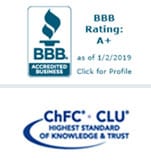

In a year which many thought would never end, miraculously we have found ourselves in December. Before the clock strikes midnight on New Year’s Eve, there are some easy steps to take on your own to prepare yourself for the upcoming Tax Season. While we highly recommend turning to trusted tax professionals for your tax preparation and planning, here are some year-end tax planning tips you can do to position yourself favorably as we roll into 2021.
1. Maximize Your Contribution to Your Retirement Plans
A must year-end tax move is to contribute the maximum to your employer sponsored 401(k) by 12/31/2020. If you’re over age 50 the total pre-tax contribution you can make for the year is $26,000. You get to decide…put something in your retirement savings account now and reduce your tax bill in April …Or don’t contribute now and simply pay more tax to the IRS. If you can’t max out your 401K, remember any contribution is better than no contribution.
If your employer offers a contribution match option, make sure to add enough to your 401(k) to benefit from the match which is the closest you will ever get to receiving free money. By the way if you are no longer with your employer we suggest you seek out a financial advisor to learn what options you may have for your 401k.
Putting the maximum amount into your IRA is also a great way to reduce your April tax bill. The good news is that you have until April 15, 2021 to fully fund the over age 50 contribution amount of $7000. Make sure to discuss this with your tax preparer to see if you’re eligible for the full contribution. Folks under age 50 if eligible may contribute up to $6000 for the 2020 tax year.
2.Look into Coronavirus-Related Distributions (CRDs)
The CARES Act introduced Coronavirus-Related Distributions (CRDs) which allow eligible individuals to withdraw up to $100,000 from a defined contribution plan or IRA, even if those plans wouldn’t allow a withdrawal under normal circumstances. Individuals who qualify are those who have been diagnosed with COVID-19 including spouses or any eligible dependents. If you share a household with an individual who has been severely financially impaired by the virus, you may also be eligible for a CRD.
If you have already received a CRD or plan to, it must be done by December 30, 2020. Any CRDs must be reported on your tax return along with IRS Form 8915-8. The taxes due on the distribution may be paid to the IRS over three years.
3. Be Charitable
A great way to lower your taxes before year-end is getting into the holiday spirit! Charitable contributions encourage you to give back and support causes you care deeply about while helping you score a tax deduction. The IRS states, “Previously, charitable contributions could only be deducted if taxpayers itemized their deductions. However, taxpayers who don’t itemize deductions may take a charitable deduction of up to $300 for cash contributions made in 2020 to qualifying organizations”.
If you wish to make a charitable contribution before year-end, check out this tool to help identify what charity best fits your passion!
4. Check Out Qualified Charitable Distributions (QCDs)
Qualified Charitable Distributions (QCDs) are money taken out of a retirement savings account and donated directly to a charitable cause by a person who is at least 70 ½. Individuals can make multiple donations up to $100,000 and couples who file jointly can double that amount. A QCD must occur by 12/31/2020 to be used to reduce your 2020 tax-year adjusted gross income (AGI) which may lower or eliminate taxes on your social security benefits. This may also help higher income individuals avoid Medicare surcharges on Parts B and D premiums.
A QCD is the most tax efficient way to make a charitable gift and in a year when the Required Minimum Distribution (RMD) is required, a QCD will satisfy an RMD up to $100,000. Make certain that the QCD is the first distribution of the year so it will be applied as a non-taxable RMD and your taxable income will be reduced. Your IRA custodian or financial advisor can assist you with a QCD.


Connor Rosenberger
connorctag@gmail.com
As Cowen Tax Advisory Group’s Digital Content Marketing Specialist, Connor provides in-house copywriting and manages the company’s electronic records system, email marketing, and blog.




